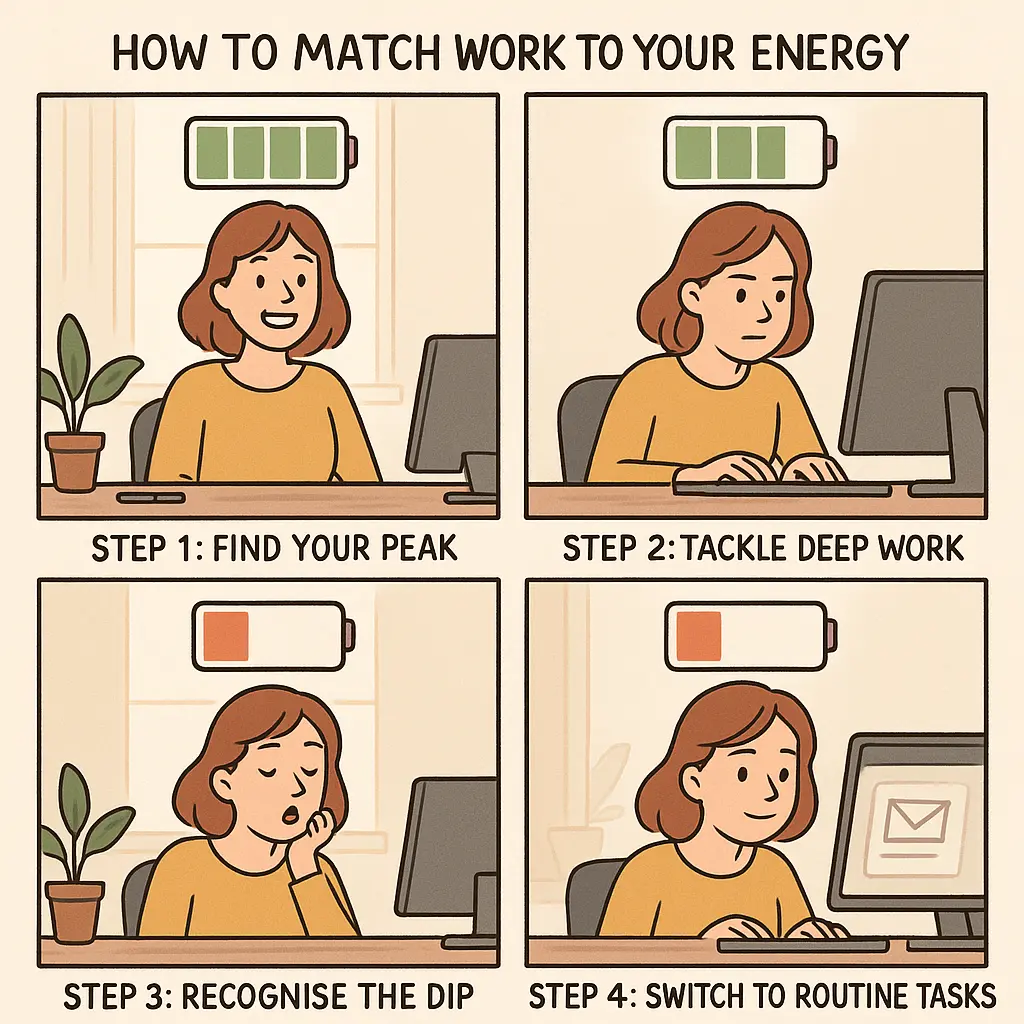
Ever tried to edit a video on your phone when it's down to 10% battery? It stutters, it lags, and nothing works smoothly. Your brain operates in exactly the same way. When your mental battery is full, you can tackle complex, focus-heavy work with clarity and ease. When it's running low, those same tasks feel impossible. The secret to getting more done isn't working harder—it's matching your work to your energy levels.
Think of attention as your brain's premium fuel. Complex tasks like deep writing, strategic planning, or detailed analysis burn through this fuel quickly. They require sharp focus, active problem-solving, and sustained concentration. Routine tasks—clearing your inbox, filling in forms, or simple updates—don't demand nearly as much. When you align the right task with the right energy level, you work smoothly and productively. When you don't, you stall, waste time restarting, and make avoidable mistakes.
Find Your Peak
The first step is to notice when you feel most alert during the day. For many people, this is in the morning, shortly after waking up and having breakfast. This is your golden window—your mental battery is fully charged, and your brain is at its sharpest. Pay attention to your own rhythms over a few days. When do you naturally feel most clear-headed? When does concentration come easily? That's your peak, and it's worth protecting.
Tackle Deep Work First
Once you've identified your peak energy window, use it wisely. This is the time to schedule your most important, complex tasks—the work that requires deep thinking and produces your best output. Whether it's writing a report, solving a tricky problem, or making strategic decisions, do it when your mental battery is full. Your brain will be faster, sharper, and you'll make fewer errors. This isn't about cramming more in—it's about doing your best work when your brain is primed for it.
Recognise the Dip
Around mid-afternoon, most people hit a natural energy dip. You might feel sluggish, find it harder to concentrate, or notice your mind wandering more easily. This is completely normal—your attention naturally weakens as the day goes on. Research shows that fatigue reduces brain activation and depletes your focus as a limited resource. Instead of fighting this dip or forcing yourself through difficult tasks, recognise it for what it is: a signal that your mental battery needs lighter work.
Switch to Routine Tasks
When your energy dips, shift gears. This is the perfect time for routine tasks that don't require premium focus—responding to emails, organising files, updating spreadsheets, or tidying your workspace. These tasks still need doing, but they don't demand the same level of mental sharpness. By saving them for your low-energy windows, you stay productive without burning out or making costly mistakes. If a dip catches you mid-deep-work, shrink the task to a bite-sized step or simply switch to something lighter until you recover. No heroics required—just smart task matching.
You don't need a perfect schedule to make this work—just a smarter one. Start by protecting one fresh hour this week for your most important task. Let your energy levels, not just your calendar, guide your day. When you work with your brain's natural rhythms instead of against them, your output will show the difference.
At Brainzyme, we understand the power of working with your brain's natural rhythms. That's why we've developed scientifically proven plant-powered focus supplements designed to support sustained attention and mental clarity throughout your day.
Discover how Brainzyme can help you make the most of your energy levels—visit www.brainzyme.com to learn more.


 DACH
DACH
 FR-BE
FR-BE
 US-CAN
US-CAN


